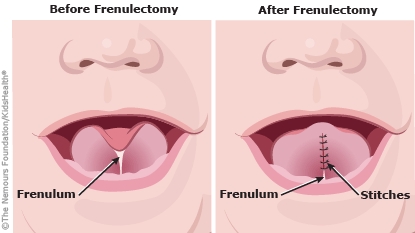After Surgery for Tongue-Tie: How to Care for Your Child
A frenulectomy (or frenulotomy or frenotomy) can make eating and speaking easier for a child with tongue-tie. Most children recover from these operations quickly and without any problems.


Lingual frenulectomy is a type of surgery that removes the frenulum (or "frenum" for short), a piece of tissue that connects the underside of the tongue to the bottom of the mouth. In frenulotomy or frenotomy, the frenulum is just cut, rather than removed. These operations let children born with tongue-tie move their tongues more freely, and can help with problems with feeding or speaking. (In tongue-tie, the frenulum is too short or thick and limits the tongue's movement.)
During the procedure, the doctor removed or clipped the frenulum so that the tongue is no longer "tied" so tightly to the bottom of the mouth or inner surface of the gums.
Your child may have some slight bleeding from under the tongue for a few hours after the surgery. There also might be some swelling and discomfort, but these should get better within a few days. If your child has stitches under the tongue, these will dissolve as the surgical site heals. They do not need to be removed by the doctor.

-
If your child did not have general anesthesia, return to feeding as normal.
-
If your child had general anesthesia, go slowly with feeding to make sure your child is not vomiting after drinking and eating.
-
If certain foods or drinks irritate your child's tongue, these should be avoided until it heals.
-
Encourage your child to do any tongue exercises prescribed by the doctor. They can strengthen the tongue and help it heal properly.
-
If your child is uncomfortable, the doctor may recommend acetaminophen or another medication.

Your child:
-
Has increased pain or swelling in the mouth.
-
Has pain that is not relieved by the recommended medication.
-
Has pus coming from under the tongue.
-
Has bleeding that continues or increases.
-
Has a fever over 101°F (38.3°C).
-
Has nausea or vomiting.
-
Has trouble swallowing or is drooling a lot.

-
Your child appears dehydrated; signs include dizziness, drowsiness, a dry or sticky mouth, sunken eyes, crying with little or no tears, or peeing less often (or having fewer wet diapers).
-
The tongue swells or your child is unable to keep it in his or her mouth.